2019全国II卷英语高考真题【2020新】
2019 英语高考真题 全国卷二 试题+答案 word 版
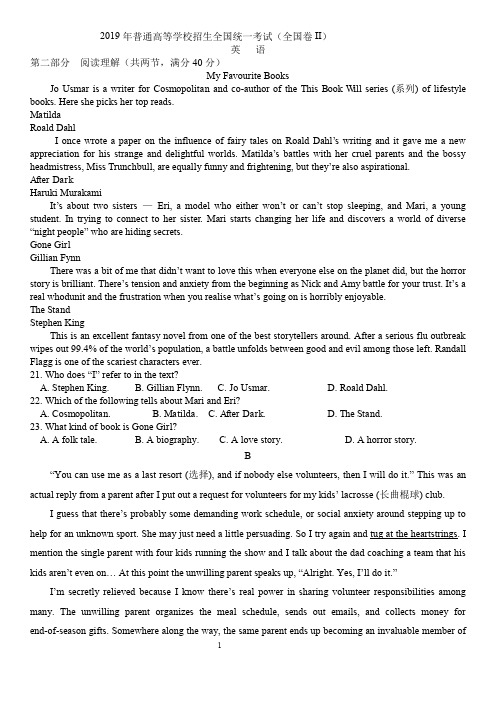
2019年普通高等学校招生全国统一考试(全国卷II)英语第二部分阅读理解(共两节,满分40分)My Favourite BooksJo Usmar is a writer for Cosmopolitan and co-author of the This Book Will series (系列) of lifestyle books. Here she picks her top reads.MatildaRoald DahlI once wrote a paper on the influence of fairy tales on Roald Dahl’s writing and it gave me a new appreciation for his strange and delightful worlds. Matilda’s battles with her cruel parents and the bossy headmistr ess, Miss Trunchbull, are equally funny and frightening, but they’re also aspirational.After DarkHaruki MurakamiIt’s about two sisters —Eri, a model who either won’t or can’t stop sleeping, and Mari, a young student. In trying to connect to her sister. Mari starts changing her life and discovers a world of diverse “night people” who are hiding secrets.Gone GirlGillian FynnThere was a bit of me that didn’t want to love this when everyone else on the planet did, but the horror story is brilliant. There’s tension and anxiety from the beginning as Nick and Amy battle for your trust. It’s a real whodunit and the frustration when you realise what’s going on is horribly enjoyable.The StandStephen KingThis is an excellent fantasy novel from one of the best storytellers around. After a serious flu outbreak wipes out 99.4% of the world’s population, a battle unfolds between good and evil among those left. Randall Flagg is one of the scariest characters ever.21. Who does “I” refer to in the text?A. Stephen King.B. Gillian Flynn.C. Jo Usmar.D. Roald Dahl.22. Which of the following tells about Mari and Eri?A. Cosmopolitan.B. Matilda.C. After Dark.D. The Stand.23. What kind of book is Gone Girl?A. A folk tale.B. A biography.C. A love story.D. A horror story.B“You can use me as a last resort (选择), and if nobody else volunteers, then I will do it.” This was an actual reply from a parent after I put out a request for volunteers for my kids’ lacrosse (长曲棍球) club.I guess that there’s probably some demanding work schedule, or social anxiety around stepping up to help for an unknown sport. She may just need a little persuading. So I try again and tug at the heartstrings. I mention the single parent with four kids running the show and I talk about the dad coaching a team that his kids aren’t even on… At this point the unwilling parent speaks up, “Alright. Yes, I’ll do it.”I’m secretly relieved because I know there’s real power in sharing volunteer responsibilities among many. The unwilling parent organizes the meal schedule, sends out emails, and collects money for end-of-season gifts. Somewhere along the way, the same parent ends up becoming an invaluable member ofthe team. The coach is able to focus on the kids while the other parents are relieved to be off the hook for another season. Handing out sliced oranges to bloodthirsty kids can be as exciting as watching your own kid score a goal.Still, most of us volunteers breathe a sigh of relief when the season comes to a close. That relief is coupled with a deep understanding of why the same people keep coming back for more: Connecting to the community (社区) as you freely give your time, money, skills, or services provides a real joy. Volunteering just feels so good.In that sense, I’m pretty sure volunteering is more of a selfish act than I’d freely like to admit. However, if others benefit in the process, and I get some reward too, does it really matter where my motivation lies?24. What can we infer about the parent from her reply in paragraph 1?A. She knows little about the club.B. She isn’t good at sports.C. She just doesn’t want to volunteer.D. She’s unabl e to meet her schedule.25. What does the underlined phrase “tug at the heartstrings” in paragraph 2 mean?A. Encourage teamwork.B. Appeal to feelings.C. Promote good deeds.D. Provide advice.26. What can we learn about the parent from paragraph 3?A. She gets interested in lacrosse.B. She is proud of her kids.C. She’ll work for another season.D. She becomes a good helper.27. Why does the author like doing volunteer work?A. It gives her a sense of duty.B. It makes her very happy.C. It enables her to work hard.D. It brings her material rewards.CMarian Bechtel sits at West Palm Beach’s Bar Louie counter by herself, quietly reading her e-book as she waits for her salad. What is she reading? None of your business! Lunch is Bechtel’s “me” time. And like more Americans, she’s not alone.A new report found 46 percent of meals are eaten alone in America. More than half (53 percent) have breakfast alone and nearly half (46 percent) have lunch by themselves. Only at dinnertime are we eating together anymore, 74 percent, according to statistics from the report.“I prefer to go out and be out. Alone, but together, you know?” Bechtel said, looking up from her book. Bechtel, who works in downtown West Palm Beach, has lunch with coworkers sometimes, but like many of us, too often works through lunch at her desk. A lunchtime escape allows her to keep a boss from tapping her on the shoulder. She returns to work feeling energized. “Today, I just wanted some time to myself,” she said.Just two seats over, Andrew Mazoleny, a local videographer, is finishing his lunch at the bar. He likes that he can sit and check his phone in peace or chat up the barkeeper with whom he’s on a first-name basis if he wants to have a little interaction (交流). “I reflect on how my day’s go ne and think about the rest of the week,” he said. “It’s a chance for self-reflection, You return to work recharged and with a plan.”That freedom to choose is one reason more people like to eat alone. There was a time when people may have felt awkward about asking for a table for one, but those days are over. Now, we have our smartphones to keep us company at the table. “It doesn’t feel as alone as it may have before all the advances in technology,” said Laurie Demeritt, whose company provided the statisti cs for the report.28. What are the statistics in paragraph 2 about?A. Food variety.B. Eating habits.C. Table manners.D. Restaurant service.29. Why does Bechtel prefer to go out for lunch?A. To meet with her coworkers.B. To catch up with her work.C. To have some time on her own.D. To collect data for her report.30. What do we know about Mazoleny?A. He makes videos for the bar.B. He’s fond of the food at the bar.C. He interviews customers at the bar.D. He’s familiar with the barkeep er.31. What is the text mainly about?A. The trend of having meals alone.B. The importance of self-reflection.C. The stress from working overtime.D. The advantage of wireless technology.DBacteria are an annoying problem for astronauts. The microorganisms (微生物) from our bodies grow uncontrollably on surfaces of the International Space Station, so astronauts spend hours cleaning them up each week. How is NASA overcoming this very tiny big problem? It’s turning to a bunch of high school kids. But not just any kids. It is depending on NASA HUNCH high school classrooms, like the one science teachers Gene Gordon and Donna Himmelberg lead at Fairport High School in Fairport, New York.HUNCH is designed to connect high school classrooms with NASA engineers. For the past two years, Gordon’s students have been studying ways to kill bacteria in zero gravity, and they think they’re close to a solution (解决方案). “We don’t give the students any breaks. They have to do it just like NASA engineers,” says Florence Gold, a project manager.“There are no tests,” Gordon says. “There is no graded homework. There almost are no grades, other than ‘Are you working towards your goal?’ Basically, it’s ‘I’ve got to produce this product and then, at theend of the year, pre sent it to NASA.’ Engineers come and really do an in-person review, and…it’s not a very nice thing at times. It’s a hard business review of your product.”Gordon says the HUNCH program has an impact (影响) on college admissions and practical life skills. “These kids are so absorbed in their studies that I just sit back. I don’t teach.” And that annoying bacteria? Gordon says his students are emailing daily with NASA engineers about the problem, readying a workable solution to test in space.32. What do we know about the bacteria in the International Space Station?A. They are hard to get rid of.B. They lead to air pollution.C. They appear in different forms.D. They damage the instruments.33. What is the purpose of the HUNCH program?A. To strengthen teacher-student relationships.B. To sharpen students’ communication skills.C. To allow students to experience zero gravity.D. To link space technology with school education.34. What do the NASA engineers do for the students in the program?A. Check their product.B. Guide project designs.C. Adjust work schedules.D. Grade their homework.35. What is the best title for the text?A. NASA: The Home of AstronautsB. Space: The Final Homework FrontierC. Nature: An Outdoor ClassroomD. HUNCH: A College Admission Reform第二节(共5小题;每小题2分,满分10分)根据短文内容,从短文后的选项中选出能填入空白处的最佳选项。
《高考真题》2019年全国统一高考英语试卷(新课标Ⅱ)(解析版)
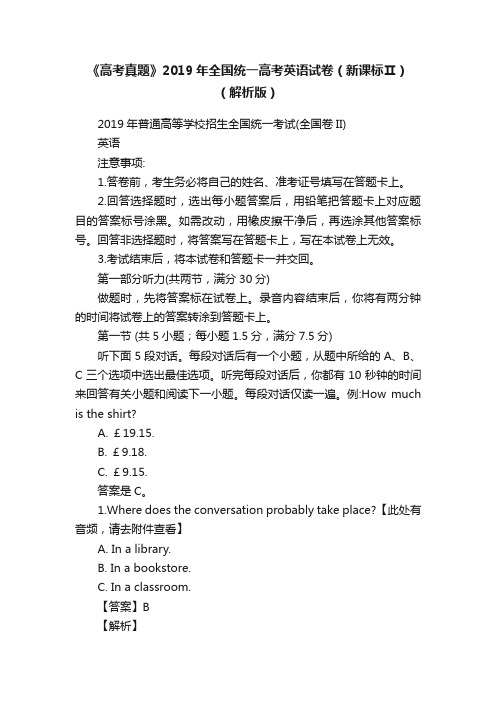
《高考真题》2019年全国统一高考英语试卷(新课标Ⅱ)(解析版)2019年普通高等学校招生全国统一考试(全国卷II)英语注意事项:1.答卷前,考生务必将自己的姓名、准考证号填写在答题卡上。
2.回答选择题时,选出每小题答案后,用铅笔把答题卡上对应题目的答案标号涂黑。
如需改动,用橡皮擦干净后,再选涂其他答案标号。
回答非选择题时,将答案写在答题卡上,写在本试卷上无效。
3.考试结束后,将本试卷和答题卡一并交回。
第一部分听力(共两节,满分30分)做题时,先将答案标在试卷上。
录音内容结束后,你将有两分钟的时间将试卷上的答案转涂到答题卡上。
第一节 (共5小题;每小题1.5分,满分7.5分)听下面5段对话。
每段对话后有一个小题,从题中所给的A、B、C三个选项中选出最佳选项。
听完每段对话后,你都有10秒钟的时间来回答有关小题和阅读下一小题。
每段对话仅读一遍。
例:How much is the shirt?A. £19.15.B. £9.18.C. £9.15.答案是C。
1.Where does the conversation probably take place?【此处有音频,请去附件查看】A. In a library.B. In a bookstore.C. In a classroom.【答案】B【解析】【详解】此为听力题,解析略。
2.How does the woman feel now?【此处有音频,请去附件查看】A. Relaxed.B. Excited.C. Tired.【答案】C【解析】【详解】此为听力题,解析略。
3.How much will the man pay?【此处有音频,请去附件查看】A. $520.B. $80.C. $100.【答案】B【解析】【详解】此为听力题,解析略。
4.What does the man tell Jane to do?【此处有音频,请去附件查看】A. Postpone his appointment.B. Meet Mr. Douglas.C. Return at 3 o’clock.【答案】A【解析】【详解】此为听力题,解析略。
2019年全国卷Ⅱ英语高考试题文档版附答案(精校版)
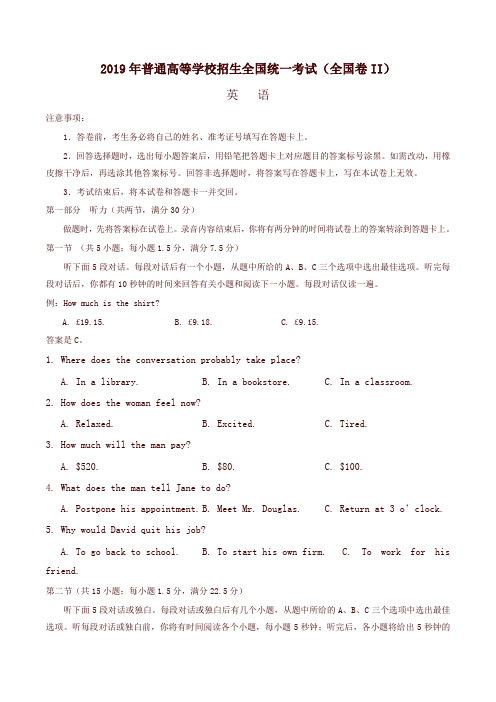
2019年普通高等学校招生全国统一考试(全国卷II)英语注意事项:1.答卷前,考生务必将自己的姓名、准考证号填写在答题卡上。
2.回答选择题时,选出每小题答案后,用铅笔把答题卡上对应题目的答案标号涂黑。
如需改动,用橡皮擦干净后,再选涂其他答案标号。
回答非选择题时,将答案写在答题卡上,写在本试卷上无效。
3.考试结束后,将本试卷和答题卡一并交回。
第一部分听力(共两节,满分30分)做题时,先将答案标在试卷上。
录音内容结束后,你将有两分钟的时间将试卷上的答案转涂到答题卡上。
第一节(共5小题;每小题1.5分,满分7.5分)听下面5段对话。
每段对话后有一个小题,从题中所给的A、B、C三个选项中选出最佳选项。
听完每段对话后,你都有10秒钟的时间来回答有关小题和阅读下一小题。
每段对话仅读一遍。
例:How much is the shirt?A. £19.15.B. £9.18.C. £9.15.答案是C。
1. Where does the conversation probably take place?A. In a library.B. In a bookstore.C. In a classroom.2. How does the woman feel now?A. Relaxed.B. Excited.C. Tired.3. How much will the man pay?A. $520.B. $80.C. $100.4. What does the man tell Jane to do?A. Postpone his appointment.B. Meet Mr. Douglas.C. Return at 3 o’clock.5. Why would David quit his job?A. To go back to school.B. To start his own firm.C. To work for his friend.第二节(共15小题;每小题1.5分,满分22.5分)听下面5段对话或独白。
2019年高考英语全国卷2-答案
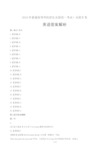
2019年普通高等学校招生全国统一考试·全国Ⅱ卷英语答案解析第一部分听力1.【答案】B2.【答案】C3.【答案】B4.【答案】A5.【答案】C6.【答案】C7.【答案】A8.【答案】B9.【答案】A10.【答案】C11.【答案】B12.【答案】A13.【答案】C14.【答案】C15.【答案】B16.【答案】A17.【答案】C18.【答案】A19.【答案】B20.【答案】A第二部分阅读理解第一节A【文章大意】本文介绍了Jo Usmar最喜欢的四本书。
21.【答案】C【解析】由标题My Favourite Books以及第一段最后一句话"Here she picks her top reads"可知,文章是以Jo Usmar的口吻进行写作的。
故选C。
【考点】代词指代22.【答案】C【解析】根据After Dark 部分中的"It's about two sisters-Eri,a model who either won't or can't stop sleeping,and Mari,a young student"可知答案为C。
【考查能力】细节理解23.【答案】D【解析】根据Gone Girl部分中的"but the horor story is brilliant"可知答案为D。
【考查能力】细节理解B【文章大意】本文介绍作者自己参与并鼓励他人参与志愿者工作的经历,论述了志愿者工作的独特意义。
24.【答案】C【解析】根据第一段第一句"You can use me as a last resort(选择),and if nobody else volunteers,then I will do it"和第二段中的"the unwilling parent "可推断,这位家长不想做志愿者工作。
(真题)2019年全国卷Ⅱ英语高考试题文档版(附答案)
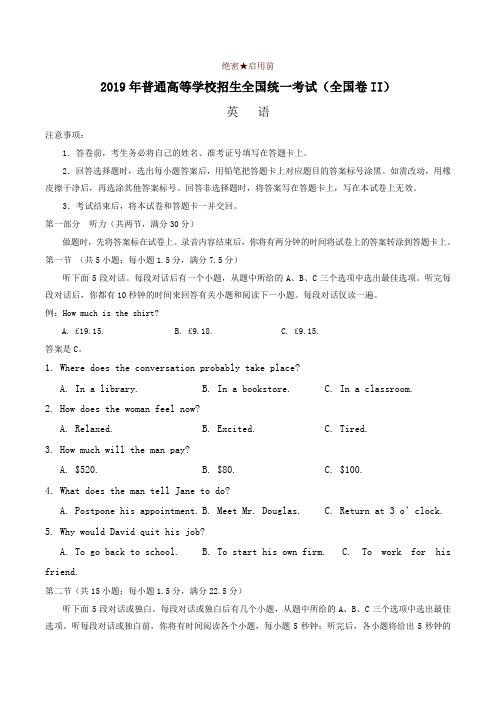
绝密★启用前2019年普通高等学校招生全国统一考试(全国卷II)英语注意事项:1.答卷前,考生务必将自己的姓名、准考证号填写在答题卡上。
2.回答选择题时,选出每小题答案后,用铅笔把答题卡上对应题目的答案标号涂黑。
如需改动,用橡皮擦干净后,再选涂其他答案标号。
回答非选择题时,将答案写在答题卡上,写在本试卷上无效。
3.考试结束后,将本试卷和答题卡一并交回。
第一部分听力(共两节,满分30分)做题时,先将答案标在试卷上。
录音内容结束后,你将有两分钟的时间将试卷上的答案转涂到答题卡上。
第一节(共5小题;每小题1.5分,满分7.5分)听下面5段对话。
每段对话后有一个小题,从题中所给的A、B、C三个选项中选出最佳选项。
听完每段对话后,你都有10秒钟的时间来回答有关小题和阅读下一小题。
每段对话仅读一遍。
例:How much is the shirt?A. £19.15.B. £9.18.C. £9.15.答案是C。
1. Where does the conversation probably take place?A. In a library.B. In a bookstore.C. In a classroom.2. How does the woman feel now?A. Relaxed.B. Excited.C. Tired.3. How much will the man pay?A. $520.B. $80.C. $100.4. What does the man tell Jane to do?A. Postpone his appointment.B. Meet Mr. Douglas.C. Return at 3 o’clock.5. Why would David quit his job?A. To go back to school.B. To start his own firm.C. To work for his friend.第二节(共15小题;每小题1.5分,满分22.5分)听下面5段对话或独白。
2019年英语高考真题全国卷2及答案

2019年普通高等学校招生全国统一考试(全国卷II)英语注意事项:1.答卷前,考生务必将自己的姓名、准考证号填写在答题卡上。
2.回答选择题时,选出每小题答案后,用铅笔把答题卡上对应题目的答案标号涂黑。
如需改动,用橡皮擦干净后,再选涂其他答案标号。
回答非选择题时,将答案写在答题卡上,写在本试卷上无效。
3.考试结束后,将本试卷和答题卡一并交回。
第一部分听力(共两节,满分30分)做题时,先将答案标在试卷上。
录音内容结束后,你将有两分钟的时间将试卷上的答案转涂到答题卡上。
第一节(共5小题;每小题1.5分,满分7.5分)听下面5段对话。
每段对话后有一个小题,从题中所给的A、B、C三个选项中选出最佳选项。
听完每段对话后,你都有10秒钟的时间来回答有关小题和阅读下一小题。
每段对话仅读一遍。
例:How much is the shirt?A. £19.15.B. £9.18.C. £9.15.答案是C。
1. Where does the conversation probably take place?A. In a library.B. In a bookstore.C. In a classroom.2. How does the woman feel now?A. Relaxed.B. Excited.C. Tired.3. How much will the man pay?A. $520.B. $80.C. $100.4. What does the man tell Jane to do?A. Postpone his appointment.B. Meet Mr. Douglas.C. Return at 3 o’clock.5. Why would David quit his job?A. To go back to school.B. To start his own firm.C. To work for hisfriend.第二节(共15小题;每小题1.5分,满分22.5分)听下面5段对话或独白。
(精校版)2019年全国卷Ⅱ英语高考真题文档版(含答案)

绝密★启用前2019年普通高等学校招生全国统一考试(全国卷II)英语注意事项:1.答卷前,考生务必将自己的姓名、准考证号填写在答题卡上。
2.回答选择题时,选出每小题答案后,用铅笔把答题卡上对应题目的答案标号涂黑。
如需改动,用橡皮擦干净后,再选涂其他答案标号。
回答非选择题时,将答案写在答题卡上,写在本试卷上无效。
3.考试结束后,将本试卷和答题卡一并交回。
第一部分听力(共两节,满分30分)做题时,先将答案标在试卷上。
录音内容结束后,你将有两分钟的时间将试卷上的答案转涂到答题卡上。
第一节(共5小题;每小题1.5分,满分7.5分)听下面5段对话。
每段对话后有一个小题,从题中所给的A、B、C三个选项中选出最佳选项。
听完每段对话后,你都有10秒钟的时间来回答有关小题和阅读下一小题。
每段对话仅读一遍。
例:How much is the shirt?A. £19.15.B. £9.18.C. £9.15.答案是C。
1. Where does the conversation probably take place?A. In a library.B. In a bookstore.C. In a classroom.2. How does the woman feel now?A. Relaxed.B. Excited.C. Tired.3. How much will the man pay?A. $20.B. $80.C. $100.4. What does the man tell Jane to do?A. Postpone his appointment.B. Meet Mr. Douglas.C. Return at 3 o’clock.5. Why would David quit his job?A. To go back to school.B. To start his own firm.C. To work for his friend.第二节(共15小题;每小题1.5分,满分22.5分)听下面5段对话或独白。
(完整版)2019年英语全国2卷真题及答案

2019年全国II卷英语高考题第二部分阅读理解(共两节,满分40分)第一节(共15小题;每小题2分,满分30分)阅读下列短文,从每题所给的A、B、C和D四个选项中,选出最佳选项。
AMy Favourite BooksJo Usmar is a writer for Cosmopolitan and co-author of the This Book W川series (系歹U) of lifestyle books. Here she picks her top reads. Matilda Roald DahlI once wrote a paper on the influence of fairy tales on Roald Dahl ' s writing and it ga me a new appreciation for his strange and delightful words. Matilda ' s battles with her cru me parents and the bossy headmisres Miss Trunchbull , are equally fumy and frightening , but they ' re also aspirational. After DarkHaruki MurakamiIt ' s about two sist-Esi, a model who either won ' t or can ' t sto|aisdeie|anga young student . In trying to connect to her sister. Mari starts changing her lif e and discovers a world of diverse “ night people “ who are hiding secrets. Gone Girl Gillian FynnThere was a bit of me that didn ' t want to love this when everyone else on the planet didbut the horror story is brilliant. There s tension and anxiety from the beginning as Nick and Amy battle for your trust. It a realswhodunit and the frustration when you realise what' s going on is horribly enjoyable The Stand Stephen KingThis is an excellent fantasy novel from one of the best storytellers around. After a serious flu outbreak wipes out 99.4% of the world ' s population, a battle unfolds between good and evilamong those let. Randall Flagg is one of the scariest characters ever.21. Who does " I " refer to in the text?23 . What kind of book is Gone Girl?)“You can use me as a last reso 选择),and if nobody else volunteers, then I will do it.This was an actual reply from a parent after I put out a request for volunteers for my kids lacrosse (长曲I 昆球) club.I guess that there ' s probably some demanding work schedule, or social anxiety around stepping up to help for an unknown sport. She may just need a little persuading. So I try againand tug at the heartstrings. I mention the single parent with four kids running the show and I talk about the dad coaching a team that his kids aren ' t even on ••• At this point the unwillirparent speaks up, “Alright. Yes, I ' ll do it. ”I ' m secretly relieved because I know there ' s real power in shaengonsiMe e s r among many. The unwilling parent organizes the meal schedule, sends out emails, and collects money for end-of-season gifts. Somewhere along the way, the same parent ends up becoming an invaluable member of the team. The coach is able to focus on the kids while the other parents are relieved to be off the hook for another season. Handing out sliced oranges to bloodthirsty kids can be as exciting as watching your own kid score a goal.Still, most of us volunteers breathe a sigh of relief when the season comes to a close. That relief is coupled with a deep understanding of why the same people keep coming back for more: Connecting to the community (社区)as you freely give your time, money, skills, or services provides a real joy. Volunteering just feels so good. In that sense, I ' m pretty sure volunteering is more of a selfish act than IHowever, if others benefit in the process, and I get some reward too, does it really matter where my motivation lies? 24 .What can we infer about the parent from her reply in paragraph l ?8. She isn ' t good at sports.C. She just doesn ' t want to volunteeD. She ' s unable to meet her schedule. 25.What does the underlined phrase “ tug at the heartstrgngph 2 mean"?A. Encourage team work .B. Appeal to feeling.C. Promote good deeds.D. Provide advice.26. What can we learn about the parent from paragraph 3 ? A. She gets interested in lacrosse. B. She is proud of her kids. C. She ' ll work for another season.D. She becomes a good helper.A. Stephen King.B. Gillian Flynn.C. Jo Usmar.D. Roald Dahl22. Which of the following tells about Mari and Eri?A. Cosmopolitan.B. Matilda.C. After Dark.D. The Stand.A.A folk tale.B.A biography.C.A love story.D.A horror story.d freely lA. She knows little about the club.27.Why does the author like doing volunteer work?A. It gives her a sense of duty.B. It makes her very happy.C. It enables her to work hard.D. It brings her material rewards.CMarian Bechtel sits at West Palm Beach ' s Bar Louie counter by herself, quietly readingher e-book as she waits for her salad. What is she reading? None of your business! Lunch is Bechtel ' s " me' time. And like more Americans, she ' s not alone.A new report found 46 percent of meals are eaten alone in America. More than half (53 percent) have breakfast alone and nearly half (46 percent) have lunch by themselves. Only at dinnertime are we eating together anymore, 74 percent, according to statistics from the report.“I prefer to go out and be out. Alone but together, you know ? ” Bechtel sai dlooking up from her book. Bechtel , who works in downtown West Palm Beach , has lunch with coworkers sometimes, but like many of us , too often works through lunch at her desk. A lunchtime escape allows her to keep a boss from tapping her on the shoulder. She returns to work feeling energized.” [odayst wanted some time to myself, “ she said.just two seats over, Andrew Mazoleny , a local videographer, is finishing his lunch at the bar. He likes that he can sit and check his phone in peace or chat up the barkeeper with whom he' s on a firstame basis if he wants to have a little interaction (交流). “I reflect on how myday' s gone and think about the rest of the week, “ he said. -reflectisna chance for selfYou return to work recharged and with a plan. ”That freedom to choose is one reason more people like to eat alone. There was a time when people may have felt awkward about asking for a table for one , but those days are over. Now , we have our smartphones to keep us company at the table."It doesn ' t feel as alone as itour bodies grow uncontrollably on surfaces of the International Space Station, so astronauts spend hours cleaning them upeach week. How is NASA overcoming this very tiny big problem? It ' s turning to a bunch of high school kids. But not just any kids. It depending on NASA HUNCH high school class, like the one science teachers Gene Gordon and Donna Himmelberg lead at Fairport High School in Fairport, New York.HUNCH is designed to connect high school classrooms with NASA engineers. For the s students have been studying ways to kill bacteria in zero gravity, re close to a (solutions) . “ We dong ivet the students any breaks.Thereare no tests, Gordon says. "Theres no graded homework. There almost are nothis product and then, at the end of year, present it to NASA. an in-person review, and …it ' s not a very nice thing at time. Ia hard business seview of your product.Gordon says the HUNCH program has an impact (影响) on college admissions andpractical life skills." These kids are so absorbed in their studies that I just sit back. I donteach. " And that annoying bacteria? Gordon says his students are emailing daily with NASA engineers about the problem, readying a workable solution to test in space.may have before al the advances in technology, provided the statistics for the report.28. What are the statistics in paragraph 2 about? A. Food variety. C. Table manners.29. Why does Bechtel prefer to go out for lunch?A. To meet with her coworkers.C. To have some time on her own. 30. What do we know about Mazoleny? A. He makes videos for the bar. C. He interviews customers at the bar. 31. What is the text mainly about? A. The trend of having meals alone. C. The stress from working overtime.said Laurie Demerit, whose companyB. Eating habits. D. Restaurant service.B. To catch up with her work.D. To collect data for her report.B. He ' s fond of the food at thear. D. He ' s familiar with the barkeeper.B. The importance of self-reflection. D. The advantage of wireless technology.(微生物)fromDBacteria are an annoying problem for astronauts. The microorganismspast two years, Gordon and they think theyThey have to do it just like NASA engineers,says Florence Gold, a project manager.grades, other thanAre you working towards your goal? Basically, it ' s ' I ve got t' Engineers come and really32.What do we know about the bacteria in the International Space Station?A. They are hard to get rid of.B. They lead to air pollution.C. They appear different forms.D. They damage the instruments.33.What is the purpose of the HUNCH program?A.To strengthen teacher-student relationships.B.To sharpen students ' communication skills.C.To allow students to experience zero gravity.D.To link space technology with school education34.What do the NASA engineers do for the students in the program?A. Check their product.B. Guide project designsC. Adjust work schedules.D. Grade their homework.35.What is the best title for the text?A.NASA: The Home of Astronauts.B. Space: The Final Homework Frontier.C. Nature: An Outdoor Classroom.D. HUNCH:A College Admission Reform.第二节(共5小题;每小题2分,满分10分)根据短文内容,从短文后的选项中选出能填入空白处的最佳选项。
2019年高考真题——英语(全国卷Ⅱ)+Word版含答案【KS5U+高考】
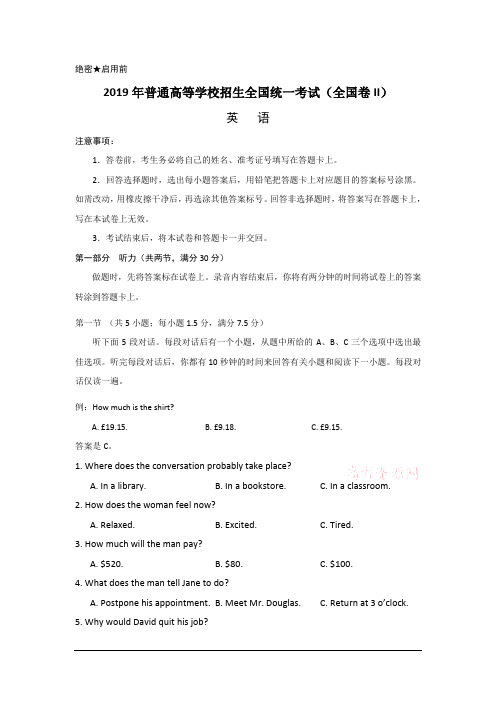
绝密★启用前2019年普通高等学校招生全国统一考试(全国卷II)英语注意事项:1.答卷前,考生务必将自己的姓名、准考证号填写在答题卡上。
2.回答选择题时,选出每小题答案后,用铅笔把答题卡上对应题目的答案标号涂黑。
如需改动,用橡皮擦干净后,再选涂其他答案标号。
回答非选择题时,将答案写在答题卡上,写在本试卷上无效。
3.考试结束后,将本试卷和答题卡一并交回。
第一部分听力(共两节,满分30分)做题时,先将答案标在试卷上。
录音内容结束后,你将有两分钟的时间将试卷上的答案转涂到答题卡上。
第一节(共5小题;每小题1.5分,满分7.5分)听下面5段对话。
每段对话后有一个小题,从题中所给的A、B、C三个选项中选出最佳选项。
听完每段对话后,你都有10秒钟的时间来回答有关小题和阅读下一小题。
每段对话仅读一遍。
例:How much is the shirt?A. £19.15.B. £9.18.C. £9.15.答案是C。
1. Where does the conversation probably take place?A. In a library.B. In a bookstore.C. In a classroom.2. How does the woman feel now?A. Relaxed.B. Excited.C. Tired.3. How much will the man pay?A. $520.B. $80.C. $100.4. What does the man tell Jane to do?A. Postpone his appointment.B. Meet Mr. Douglas.C. Return at 3 o’clock.5. Why would David quit his job?A. To go back to school.B. To start his own firm.C. To work for his friend. 第二节(共15小题;每小题1.5分,满分22.5分)听下面5段对话或独白。
(精校版)2019年全国卷Ⅱ英语高考试题文档版(含答案)

绝密★启用前2019年普通高等学校招生全国统一考试(全国卷II)英语注意事项:1.答卷前,考生务必将自己的姓名、准考证号填写在答题卡上。
2.回答选择题时,选出每小题答案后,用铅笔把答题卡上对应题目的答案标号涂黑。
如需改动,用橡皮擦干净后,再选涂其他答案标号。
回答非选择题时,将答案写在答题卡上,写在本试卷上无效。
3.考试结束后,将本试卷和答题卡一并交回。
第一部分听力(共两节,满分30分)做题时,先将答案标在试卷上。
录音内容结束后,你将有两分钟的时间将试卷上的答案转涂到答题卡上。
第一节(共5小题;每小题1.5分,满分7.5分)听下面5段对话。
每段对话后有一个小题,从题中所给的A、B、C三个选项中选出最佳选项。
听完每段对话后,你都有10秒钟的时间来回答有关小题和阅读下一小题。
每段对话仅读一遍。
例:How much is the shirt?A. £19.15.B. £9.18.C. £9.15.答案是C。
1. Where does the conversation probably take place?A. In a library.B. In a bookstore.C. In a classroom.2. How does the woman feel now?A. Relaxed.B. Excited.C. Tired.3. How much will the man pay?A. $520.B. $80.C. $100.4. What does the man tell Jane to do?A. Postpone his appointment.B. Meet Mr. Douglas.C. Return at 3 o’clock.5. Why would David quit his job?A. To go back to school.B. To start his own firm.C. To work for his friend.第二节(共15小题;每小题1.5分,满分22.5分)听下面5段对话或独白。
2019年全国II卷英语高考真题含答案
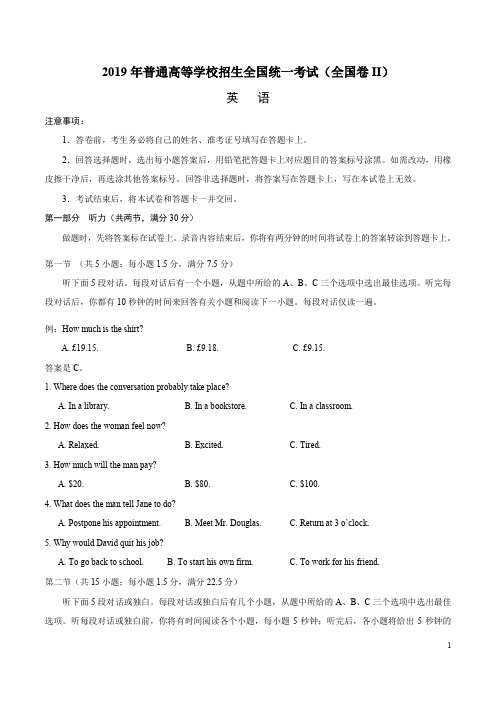
2019年普通高等学校招生全国统一考试(全国卷II)英语注意事项:1.答卷前,考生务必将自己的姓名、准考证号填写在答题卡上。
2.回答选择题时,选出每小题答案后,用铅笔把答题卡上对应题目的答案标号涂黑。
如需改动,用橡皮擦干净后,再选涂其他答案标号。
回答非选择题时,将答案写在答题卡上,写在本试卷上无效。
3.考试结束后,将本试卷和答题卡一并交回。
第一部分听力(共两节,满分30分)做题时,先将答案标在试卷上。
录音内容结束后,你将有两分钟的时间将试卷上的答案转涂到答题卡上。
第一节(共5小题;每小题1.5分,满分7.5分)听下面5段对话。
每段对话后有一个小题,从题中所给的A、B、C三个选项中选出最佳选项。
听完每段对话后,你都有10秒钟的时间来回答有关小题和阅读下一小题。
每段对话仅读一遍。
例:How much is the shirt?A. £19.15.B. £9.18.C. £9.15.答案是C。
1. Where does the conversation probably take place?A. In a library.B. In a bookstore.C. In a classroom.2. How does the woman feel now?A. Relaxed.B. Excited.C. Tired.3. How much will the man pay?A. $20.B. $80.C. $100.4. What does the man tell Jane to do?A. Postpone his appointment.B. Meet Mr. Douglas.C. Return at 3 o’clock.5. Why would David quit his job?A. To go back to school.B. To start his own firm.C. To work for his friend.第二节(共15小题;每小题1.5分,满分22.5分)听下面5段对话或独白。
2019年普通高等学校招生全国统一考试英语真题及答案解析(卷二)
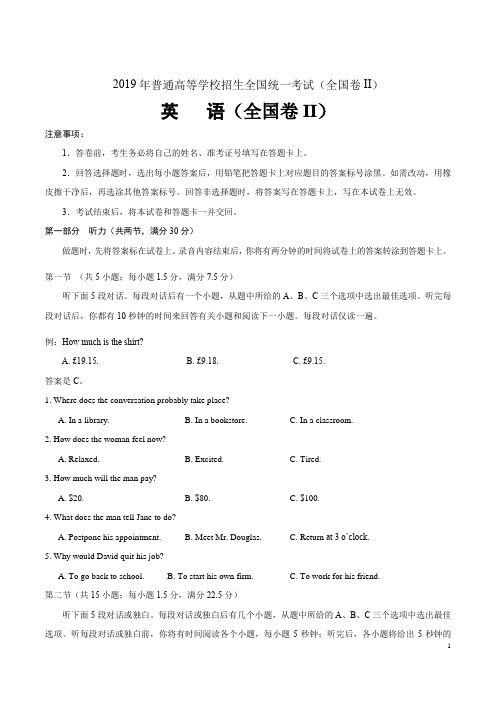
2019年普通高等学校招生全国统一考试(全国卷II)英语(全国卷II)注意事项:1.答卷前,考生务必将自己的姓名、准考证号填写在答题卡上。
2.回答选择题时,选出每小题答案后,用铅笔把答题卡上对应题目的答案标号涂黑。
如需改动,用橡皮擦干净后,再选涂其他答案标号。
回答非选择题时,将答案写在答题卡上,写在本试卷上无效。
3.考试结束后,将本试卷和答题卡一并交回。
第一部分听力(共两节,满分30分)做题时,先将答案标在试卷上。
录音内容结束后,你将有两分钟的时间将试卷上的答案转涂到答题卡上。
第一节(共5小题;每小题1.5分,满分7.5分)听下面5段对话。
每段对话后有一个小题,从题中所给的A、B、C三个选项中选出最佳选项。
听完每段对话后,你都有10秒钟的时间来回答有关小题和阅读下一小题。
每段对话仅读一遍。
例:How much is the shirt?A. £19.15.B. £9.18.C. £9.15.答案是C。
1. Where does the conversation probably take place?A. In a library.B. In a bookstore.C. In a classroom.2. How does the woman feel now?A. Relaxed.B. Excited.C. Tired.3. How much will the man pay?A. $20.B. $80.C. $100.4. What does the man tell Jane to do?A. Postpone his appointment.B. Meet Mr. Douglas.C. Return at 3 o’clock.5. Why would David quit his job?A. To go back to school.B. To start his own firm.C. To work for his friend.第二节(共15小题;每小题1.5分,满分22.5分)听下面5段对话或独白。
(完整版)2019年高考英语全国2卷(附答案)

学校:___________________________年_______班姓名:____________________学号:________---------密封线---------密封线---------绝密★启用前2019年普通高等学校招生全国统一考试英语全国II 卷(全卷共12页)(适用地区:内蒙古/黑龙江/辽宁/吉林/重庆/陕西/甘肃/宁夏/青海/新疆/西藏/海南)注意事项:1.答卷前,考生务必将自己的姓名、考生号等填写在答题卡和试卷指定位置上。
2.回答选择题时,选出每小题答案后,用铅笔把答题卡上对应题目的答案标号涂黑。
如需改动,用橡皮擦干净后,再选涂其它答案标号,回答非选择题时,将答案写在答题卡上,写在本试卷上无效。
3.考试结束后,将本试卷和答案卡一并交回。
第一部分听力(共两节,满分30分)做题时,先将答案标在试卷上。
录音内容结束后,你将有两分钟的时间将试卷上的答案转涂到答题卡上。
第一节(共5小题;每小题1.5分,满分7.5分)听下面5段对话。
每段对话后有一个小题,从题中所给的A 、B 、C 三个选项中选出最佳选项。
听完每段对话后,你都有10秒钟的时间来回答有关小题和阅读下一小题。
每段对话仅读一遍。
例:How much is the shirt?A. £19.15.B. £9.18.C. £9.15.答案是C 。
1. Where does the conversation probably take place?A. In a library.B. In a bookstore.C. In a classroom.2. How does the woman feel now?A. Relaxed.B. Excited.C. Tired.3. How much will the man pay? A. $520. B. $80.C. $100.4. What does the man tell Jane to do?A. Postpone his appointment.B. Meet Mr. Douglas.C. Return at 3 o ’clock.5. Why would David quit his job? A. To go back to school. B. To start his own firm. C. To work for his friend.第二节(共15小题;每小题1.5分,满分22.5分)听下面5段对话或独白。
【精编版】2019年高考全国Ⅱ卷英语真题(含答案)
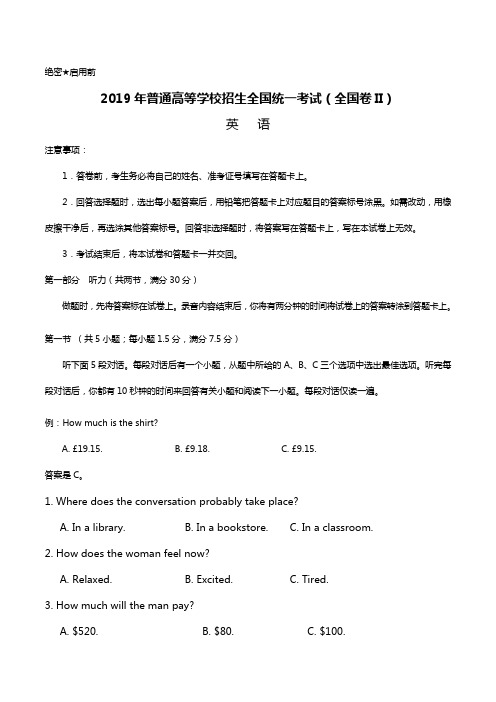
绝密★启用前2019年普通高等学校招生全国统一考试(全国卷II)英语注意事项:1.答卷前,考生务必将自己的姓名、准考证号填写在答题卡上。
2.回答选择题时,选出每小题答案后,用铅笔把答题卡上对应题目的答案标号涂黑。
如需改动,用橡皮擦干净后,再选涂其他答案标号。
回答非选择题时,将答案写在答题卡上,写在本试卷上无效。
3.考试结束后,将本试卷和答题卡一并交回。
第一部分听力(共两节,满分30分)做题时,先将答案标在试卷上。
录音内容结束后,你将有两分钟的时间将试卷上的答案转涂到答题卡上。
第一节(共5小题;每小题1.5分,满分7.5分)听下面5段对话。
每段对话后有一个小题,从题中所给的A、B、C三个选项中选出最佳选项。
听完每段对话后,你都有10秒钟的时间来回答有关小题和阅读下一小题。
每段对话仅读一遍。
例:How much is the shirt?A. £19.15.B. £9.18.C. £9.15.答案是C。
1. Where does the conversation probably take place?A. In a library.B. In a bookstore.C. In a classroom.2. How does the woman feel now?A. Relaxed.B. Excited.C. Tired.3. How much will the man pay?A. $520.B. $80.C. $100.4. What does the man tell Jane to do?A. Postpone his appointment.B. Meet Mr. Douglas.C. Return at 3 o’clock.5. Why would David quit his job?A. To go back to school.B. To start his own firm.C. To work for his friend. 第二节(共15小题;每小题1.5分,满分22.5分)听下面5段对话或独白。
2019年高考英语全国2卷(附答案)
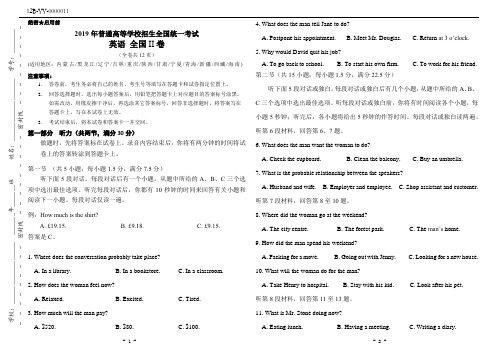
学校:____________________ _______年_______班 姓名:____________________ 学号:________- - - - - - - - - 密封线 - - - - - - - - - 密封线 - - - - - - - - -绝密★启用前2019年普通高等学校招生全国统一考试英语 全国II 卷(全卷共12页)(适用地区:内蒙古/黑龙江/辽宁/吉林/重庆/陕西/甘肃/宁夏/青海/新疆/西藏/海南) 注意事项:1.答卷前,考生务必将自己的姓名、考生号等填写在答题卡和试卷指定位置上。
2. 回答选择题时,选出每小题答案后,用铅笔把答题卡上对应题目的答案标号涂黑。
如需改动,用橡皮擦干净后,再选涂其它答案标号,回答非选择题时,将答案写在答题卡上,写在本试卷上无效。
3.考试结束后,将本试卷和答案卡一并交回。
第一部分 听力(共两节,满分30分)做题时,先将答案标在试卷上。
录音内容结束后,你将有两分钟的时间将试卷上的答案转涂到答题卡上。
第一节 (共5小题;每小题1.5分,满分7.5分)听下面5段对话。
每段对话后有一个小题,从题中所给的A 、B 、C 三个选项中选出最佳选项。
听完每段对话后,你都有10秒钟的时间来回答有关小题和阅读下一小题。
每段对话仅读一遍。
例:How much is the shirt?A. £19.15.B. £9.18.C. £9.15.答案是C 。
1. Where does the conversation probably take place? A. In a library.B. In a bookstore.C. In a classroom.2. How does the woman feel now? A. Relaxed.B. Excited.C. Tired.3. How much will the man pay? A. $520.B. $80.C. $100.4. What does the man tell Jane to do?A. Postpone his appointment.B. Meet Mr. Douglas.C. Return at 3 o’clock. 5. Why would David quit his job?A. To go back to school.B. To start his own firm.C. To work for his friend. 第二节(共15小题;每小题1.5分,满分22.5分)听下面5段对话或独白。
2019年全国普通高等学校招生统一考试英语(全国卷2正式版)【含答案及解析】

2019年全国普通高等学校招生统一考试英语(全国卷2正式版)【含答案及解析】姓名___________ 班级____________ 分数__________一、阅读理解1. In the coming months, we are bringing together artists f r o m all over the globe, to enjoy speaking Shakespeare’s plays in their own language, in our Globe, within the architecture Shakespeare wrote for. Please come and join us.National Theatre of China Beijing|ChineseThis great occasion( 盛会) will be the National Theatre of China’s first visit to the UK. The company’s productions show the new face of 21 st century Chinese theatre. This production of Shakespeare’s Richard III will be directed by the National’s Associate Director , Wang Xiaoying.Date & Time: Saturday 28 April,2.30pm & Sunday 29 April,1.30pm &6.30pmMarjanishvili Theatre Tbilisi | GeorgianOne of the most famous theatres in Georgia, the Marjanishvili, founded in 1928, appears regularly at theatre festivals all over the world. This new production of It is helmed (指导)by the company’s Artistic Director Levan Tsuladze.Date & Time: Friday 18May, 2.30pm & Saturday 19May,7.30pmDeafinitely Theatre London | British Sign Language ( BSL )By translating the rich and humourous text of Love’s Labour’s Lost into the physical language of BSL, Deafinitely Theatre creates a new interpretation of Shakespeare’s comedy and aims to build a br idge between deaf and hearing worlds by performing to both groups as one audience.Date & Time : Tuesday 22 May,2.30pm & Wednesday 23 May,7.30pmHabima National Theatre Tel Aviv | HebrewThe Habima is the centre of Hebrew-language theatre worldwide ,Founded in Moscow after the 1905 revolution, the company eventually settled in Tel Avivin the late 1920s,Since 1958, z&xxk they have been recognised as the national theatre of Israel .This production of Shakespeare’s The Merchant of Venice marks their first visit to the UK.Date & Time : Monday 28May,7.30 & Tuesday 29 May,7.30pm1.W hich play will be performed by the National Theatre of China?A. Richard Ⅲ .B. Lover’s Labour’s LostC. As You Like ItD. The Merchant of Venice2. What is special about Deafinitely Theatre?A.It has two groups of actorsB.It is the leading theatre in LondonC.It performs plays in BSLD.It is good at producing comedies3. When can you see a play in Hebrew?A.On Saturday 28 April.B.On Sunday 29 AprilC.On Tuesday 22 May.D. On Tuesday 29 May2. I first met Paul Newman in 1968, when George Roy Hill, the director of Butch Cassidy and the Sundance Kid , introduced us in New York City. When the studio didn’t want me for the film - it wanted somebody as well known as Paul - he stood up for me. I don’t know how many people would have done that; they would have listened to their agents or the studio powers.The friendship that grew out of the experience of making that film and The Sting four years later had its root in the fact that although there was an age difference, we both came from a tradition of theater and live TV. We were respectful of craft (技艺) and focused on digging into the characters we were going to play. Both of us had the qualities and virtues that are typical of American actors: humorous, aggressive, and making fun of each other - but always with an underlying affection. Those were also at the core (核心) of our relationship off the screen.We shared the brief that if you’re fortunate enough to have success, you should put something back - he with his Newman’s Own food and his Hole in the Wall camps for kids who are seriously ill, and me with Sundance and theinst itute and the festival. Paul and I didn’t see each other all that regularly, but sharing that brought us together. We supported each other financially and by showing up at events.I last saw him a few months ago. He’d been in and out of the hospital. He and I both knew what the deal was, and we didn’t talk about it. Ours wasa relationship that didn’t need a lot of words.1. Why was the studio unwilling to give the role to author at first?A.Paul Newman wanted it.B.The studio pow ers didn’t like his agent.C.He wasn’t famous enough.D.The director recommended someone else.2. Why did Paul and the author have a lasting friendship?A.They were of the same dge.B.They worked in the same theater.C.They were both good actors.D.They han similar charactertics.3. What does the underlined word “that” in paragraph 3 refer to?A.Their belief.B.Their care for chileden.C.Their success.D.Their support for each other.4. What is the author’s purpose in writing the test?A.To show his love of films.B.To remember a friend.C.To introduce a new movie.D.To share his acting experience.3. Terrafugia Inc. said Monday that its new flying car has completed its first flight, bringing the company closer to its goal of selling the flying car within the next year. The vehicle-named the Transition – has two seats ,four wheels and wings that fold up so it can be driven like a car. The Transition, which flew at 1,400 feet for eight minutes last month, can reach around 70 miles per hour on the road and 115 in the air. It flies using a 23-gallon tank of gas and bums 5 gallons per hour in the air. On the ground, it gets 35 miles per gallon.Around 100 people have already put down a $10,000 deposit to get a Transition when they go on sale, and those numbers will likely rise after Terrafugia introduces the Transition to the public later this week at the New York Auto Show. Bu t don’t expect it to show up in too many driveways. It’s expected to cost $279,000.And it won’t help if you’re stuck in traffic. The car needs a runway.Inventors have been trying to make flying cars since the 1930s, according to Robert Mann, an airline industry expert. But Mann thinks Terrafugia has come closer than anyone to making the flying car a reality. The govemment has already permitted the company to use special materials to make it easier for the vehicle to fly. The Transition is now going through crash tests to make sure it meets federal safety standards.Mann said Terrafugia was helped by the Federal Aviation Administration’s decision five years ago to create a separate set of standards for light sport aircraft, which are lower than those pilots of larger planes Terrafugia saysan owner would need to pass a test and complete 20 hours of flying time to be able to fly the Transition, a requirement pilots would find redatively easy to meet.1. What is the first paragraph mainly about?A. The basic data of the Transition.B. The advantages of flying cars.C. The potential market for flying cars. C. The designers of the Transition.2. Why is the Transition unlikely to show up in too many driveways?A. It causes traffic jams.B. It is difficult to operate.C. It is very expensive.D. It bums too much fuel.3. What is the government’s attitude to the development of the flying car?A. CautiousB. Favorable.C. Ambiguous.D. Disapproving.4. What is the best title for the text?A. Flying Car at Auto ShowB. The Transition’s Fist FlightC.Pilots’Dream Coming TrueD. Flying Car Closer to Reality4. When a leafy plant is under attack , it doesn’t sit qu ietly. Back in 1983,two scientists,Jack Schultz and Ian Baldwin, reported that young maple trees getting bitten by insects send out a particular smell that neighboring plants can get. These chemicals come from the injured parts of the plant and seem to be an alarm.What the plants pump through the air is a mixture of chemicals known as volatile organic compounds,VOCs for short.Scientists have found that all kinds of plants give out VOCs when being attacked .It’s a plant’s way of crying out.But is any onelistening?Apparently.Because we can watch the neighbours react.Some plants pump out smelly chemicals to keep insects away.But others do double duty .They pump out perfumes designed to attract different insects who are natural enemies to the attackers.Once they arrive,the tables areturned .The attacker who was lunching now becomes lunch.In study after study,it appears that these chemical conversations help the neighbors .The damage is usually more serious on the first plant,but the neighbors ,relatively speaking ,stay safer because they heard the alarm and knew what to do.Does this mean that plants talk to each other? Scientists don’t know. Maybe the first plant just made a cry of pain or was sending a message to its own branches, and so, in effect, was talking to itself. Perhaps the neighbors just happened to “overhear” the cry. So information was exchanged, but it wasn’t a true, intentional back and forth.Charles Darwin, over 150 years ago, imagined a world far busier, noisier andmore intimate( 亲密的 ) than the world we can see and hear. Our senses are weak. There’s a whole lot going on.1. What does a plant do when it is under attack?A. It makes noises.B. It gets help from other plants.C. It stands quietlyD. It sends out certain chemicals.2. What does the author mean by “the tables are turned” in paragraph 3?A. The attackers get attacked.B. The insects gather under the table.C. The plants get ready to fight back.D. The perfumes attract natural enemies.3. Scientists find from their studies that plants can________________________ .A.predict natural disastersB.protect themselves against insectsC.talk to one another intentionallyD.help their neighbors when necessary4. what can we infer from the last paragraph?A.The word is changing faster than ever.B.People have stronger senses than beforeC.The world is more complex than it seemsD.People in Darwin’s time were more imaginative.二、七选五5. 根据短文内容,从短文后的选项中选出能填入空白处的最佳选项。
2019年高考真题——英语(全国卷Ⅱ)附答案
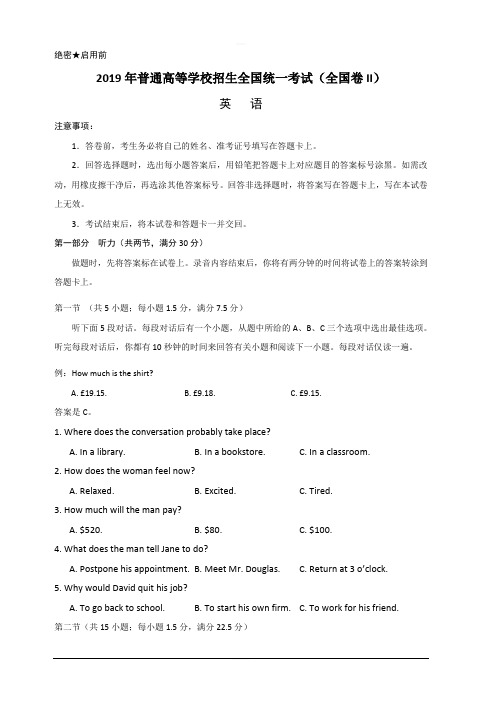
绝密★启用前2019年普通高等学校招生全国统一考试(全国卷II)英语注意事项:1.答卷前,考生务必将自己的姓名、准考证号填写在答题卡上。
2.回答选择题时,选出每小题答案后,用铅笔把答题卡上对应题目的答案标号涂黑。
如需改动,用橡皮擦干净后,再选涂其他答案标号。
回答非选择题时,将答案写在答题卡上,写在本试卷上无效。
3.考试结束后,将本试卷和答题卡一并交回。
第一部分听力(共两节,满分30分)做题时,先将答案标在试卷上。
录音内容结束后,你将有两分钟的时间将试卷上的答案转涂到答题卡上。
第一节(共5小题;每小题1.5分,满分7.5分)听下面5段对话。
每段对话后有一个小题,从题中所给的A、B、C三个选项中选出最佳选项。
听完每段对话后,你都有10秒钟的时间来回答有关小题和阅读下一小题。
每段对话仅读一遍。
例:How much is the shirt?A. £19.15.B. £9.18.C. £9.15.答案是C。
1. Where does the conversation probably take place?A. In a library.B. In a bookstore.C. In a classroom.2. How does the woman feel now?A. Relaxed.B. Excited.C. Tired.3. How much will the man pay?A. $520.B. $80.C. $100.4. What does the man tell Jane to do?A. Postpone his appointment.B. Meet Mr. Douglas.C. Return at 3 o’clock.5. Why would David quit his job?A. To go back to school.B. To start his own firm.C. To work for his friend.第二节(共15小题;每小题1.5分,满分22.5分)听下面5段对话或独白。
- 1、下载文档前请自行甄别文档内容的完整性,平台不提供额外的编辑、内容补充、找答案等附加服务。
- 2、"仅部分预览"的文档,不可在线预览部分如存在完整性等问题,可反馈申请退款(可完整预览的文档不适用该条件!)。
- 3、如文档侵犯您的权益,请联系客服反馈,我们会尽快为您处理(人工客服工作时间:9:00-18:30)。
2019年普通高等学校招生全国统一考试(全国卷II)英语注意事项:1.答卷前,考生务必将自己的姓名、准考证号填写在答题卡上。
2.回答选择题时,选出每小题答案后,用铅笔把答题卡上对应题目的答案标号涂黑。
如需改动,用橡皮擦干净后,再选涂其他答案标号。
回答非选择题时,将答案写在答题卡上,写在本试卷上无效。
3.考试结束后,将本试卷和答题卡一并交回。
第一部分听力(共两节,满分30分)做题时,先将答案标在试卷上。
录音内容结束后,你将有两分钟的时间将试卷上的答案转涂到答题卡上。
第一节(共5小题;每小题1.5分,满分7.5分)听下面5段对话。
每段对话后有一个小题,从题中所给的A、B、C三个选项中选出最佳选项。
听完每段对话后,你都有10秒钟的时间来回答有关小题和阅读下一小题。
每段对话仅读一遍。
例:How much is the shirt?A. £19.15.B. £9.18.C. £9.15.答案是C。
1. Where does the conversation probably take place?A. In a library.B. In a bookstore.C. In a classroom.2. How does the woman feel now?A. Relaxed.B. Excited.C. Tired.3. How much will the man pay?A. $20.B. $80.C. $100.4. What does the man tell Jane to do?A. Postpone his appointment.B. Meet Mr. Douglas.C. Return at 3 o’clock.5. Why would David quit his job?A. To go back to school.B. To start his own firm.C. To work for his friend. 第二节(共15小题;每小题1.5分,满分22.5分)听下面5段对话或独白。
每段对话或独白后有几个小题,从题中所给的A、B、C三个选项中选出最佳选项。
听每段对话或独白前,你将有时间阅读各个小题,每小题5秒钟;听完后,各小题将给出5秒钟的作答时间。
每段对话或独白读两遍。
听第6段材料,回答第6、7题。
6. What does the man want the woman to do?A. Check the cupboard.B. Clean the balcony.C. Buy an umbrella.7. What is the probable relationship between the speakers?A. Husband and wife.B. Employer and employee.C. Shop assistant and customer. 听第7段材料,回答第8至10题。
8. Where did the woman go at the weekend?A. The city centre.B. The forest park.C. The man’s home.9. How did the man spend his weekend?A. Packing for a move.B. Going out with Jenny.C. Looking for a new house.10. What will the woman do for the man?A. Take Henry to hospital.B. Stay with his kid.C. Look after his pet.听第8段材料,回答第11至13题。
11. What is Mr. Stone doing now?A. Eating lunch.B. Having a meeting.C. Writing a diary.12. Why does the man want to see Mr. Stone?A. To discuss a program.B. To make a travel plan.C. To ask for sick leave.13. When will the man meet Mr. Stone this afternoon?A. At 3:00.B. At 3:30.C. At 3:45.听第9段材料,回答第14至16题。
14. What are the speakers talking about?A. A company.B. An interview.C. A job offer.15. Who is Monica Stansfield?A. A junior specialist.B. A department manager.C. A sales assistant.16. When will the man hear from the woman?A. On Tuesday.B. On Wednesday.C. On Thursday.听第10段材料,回答第17至20题。
17. What did John enjoy doing in his childhood?A. Touring France.B. Playing outdoors.C. Painting pictures.18. What did John do after he moved to the US?A. He did business.B. He studied biology.C. He worked on a farm.19. Why did John go hunting?A. For food.B. For pleasure.C. For money.20. What is the subject of John’s works?A. American birds.B. Natural scenery.C. Family life.第二部分阅读理解(共两节,满分40分)第一节(共15小题;每小题2分,满分30分)阅读下列短文,从每题所给的A、B、C和D四个选项中,选出最佳选项。
AMy Favourite BooksJo Usmar is a writer for Cosmopolitan and co-author of the This Book Will series(系列)of lifestyle books. Here she picks her top reads.MatildaRoald DahlI once wrote a paper on the influence of fairy tales on Roald Dahl's writing and it gave mea new appreciation for his strange and delightful words. Matilda's battles with her cruel parents and the bossy headmistress, Miss Trunchbull,are equally fumy and frightening, but they're also aspirational.After DarkHaruki MurakamiIt’s about two sisters — Eri, a model who either won’t or can’t stop sleeping, and Mari, a young student. In trying to connect to her sister, Mari starts changing her life and discovers a world of diverse "night people" who are hiding secrets.Gone GirlGillian FlynnThere was a bit of me that didn't want to love this when everyone else on the planet did, but the horror story is brilliant. There's tension and anxiety from the beginning as Nick and Amy battle for your trust. It's a real whodunit and the frustration when you realise what's going on is horribly enjoyable.The StandStephen KingThis is an excellent fantasy novel from one of the best storytellers around. After a serious flu outbreak wipes out 99.4% of the world's population, a battle unfolds between good and evil among those left. Randall Flagg is one of the scariest characters ever.21. Who does "I" refer to in the text?A. Stephen King.B. Gillian Flynn.C. Jo Usmar.D. Roald Dahl.22. Which of the following tells about Mari and Eri?A. Cosmopolitan.B. Matilda.C. After Dark.D. The Stand.23. What kind of book is G one Girl?A.A folk tale.B.A biography.C.A love story.D.A horror story.B"You can use me as a last resort(选择), and if nobody else volunteers, then I will do it." This was an actual reply from a parent after I put out a request for volunteers for my kids' lacrosse (长曲棍球)club.I guess that there's probably some demanding work schedule, or social anxiety around stepping up to help for an unknown sport. She may just need a little persuading. So I try again and tug at the heartstrings. I mention the single parent with four kids running the show and I talk about the dad coaching a team that his kids aren’t even on… At this point the unwilling parent speaks up, "Alright. Yes, I’ll do it."I’m secretly relieved because I know there’s real power in sharing volunteer responsibilities among many. The unwilling parent organizes the meal schedule, sends out emails, and collects money for end-of-season gifts. Somewhere along the way, the same parent ends up becoming an invaluable member of the team. The coach is able to focus on the kids while the other parents are relieved to be off the hook for another season. Handing out sliced oranges to bloodthirsty kids can be as exciting as watching your own kid score a goal.Still, most of us volunteers breathe a sigh of relief when the season comes to a close. That relief is coupled with a deep understanding of why the same people keep coming back for more: Connecting to the community(社区)as you freely give your time, money, skills, or services provides a real joy. Volunteering just feels so good.In that sense, I’m pretty sure volunteering is more of a selfish act than I’d freely like to admit. However, if others benefit in the process, and I get some reward too, does it really matter where my motivation lies?24. What can we infer about the parent from her reply in paragraph l?A. She knows little about the club.B. She isn't good at sports.C. She just doesn't want to volunteer.D. She's unable to meet her schedule.25. What does the underlined phrase "tug at the heartstrings" in paragraph 2 mean?A. Encourage team work.B. Appeal to feelings.C. Promote good deeds.D. Provide advice.26. What can we learn about the parent from paragraph 3?A. She gets interested in lacrosse.B. She is proud of her kids.C. She’ll work for another season.D. She becomes a good helper.27. Why does the author like doing volunteer work?A. It gives her a sense of duty.B. It makes her very happy.C. It enables her to work hard.D. It brings her material rewards.CMarian Bechtel sits at West Palm Beach’s Bar Louie counter by herself, quietly reading her e-book as she waits for her salad. What is she reading? None of your business! Lunch is Bechtel’s "me" time. And like more Americans, she’s not alone.A new report found 46 percent of meals are eaten alone in America. More than half(53 percent)have breakfast alone and nearly half(46 percent)have lunch by themselves. Only at dinnertime are we eating together anymore, 74 percent, according to statistics from the report."I prefer to go out and be out. Alone, but together, you know?" Bechtel said, looking up from her book. Bechtel, who works in downtown West Palm Beach, has lunch with coworkers sometimes, but like many of us, too often works through lunch at her desk. A lunchtime escape allows her to keep a boss from tapping her on the shoulder. She returns to work feeling energized. "Today, I just wanted some time to myself," she said.Just two seats over, Andrew Mazoleny, a local videographer, is finishing his lunch at the bar. He likes that he can sit and check his phone in peace or chat up the barkeeper with whom he's on a first-name basis if he wants to have a little interaction(交流). "I reflect on how my day's gone and think about the rest of the week," he said. "It's a chance for self-reflection, You return to work recharged and with a plan."That freedom to choose is one reason more people like to eat alone. There was a time when people may have felt awkward about asking for a table for one, but those days are over. Now, we have our smartphones to keep us company at the table. "It doesn't feel as alone as it may have before all the advances in technology," said Laurie Demeritt, whose company provided the statistics for the report.28. What are the statistics in paragraph 2 about?A. Food variety.B. Eating habits.C. Table manners.D. Restaurant service.29. Why does Bechtel prefer to go out for lunch?A. To meet with her coworkers.B. To catch up with her work.C. To have some time on her own.D. To collect data for her report.30. What do we know about Mazoleny?A. He makes videos for the bar.B. He’s fond of the food at the bar.C. He interviews customers at the bar.D. He’s familiar with the barkeeper.31. What is the text mainly about?A. The trend of having meals alone.B. The importance of self-reflection.C. The stress from working overtime.D. The advantage of wireless technology.DBacteria are an annoying problem for astronauts. The microorganisms(微生物) from our bodies grow uncontrollably on surfaces of the International Space Station, so astronauts spend hours cleaning them up each week. How is NASA overcoming this very tiny big problem? It’s turning to a bunch of high school kids. But not just any kids. It depending on NASA HUNCH high school classrooms, like the one science teachers Gene Gordon and Donna Himmelberg lead at Fairport High School in Fairport, New York.HUNCH is designed to connect high school classrooms with NASA engineers. For the past two years, Gordon’s students have been studying ways to kill bacteria in zero gravity, and they think they’re close to a solution(解决方案). “We don’t give the students any breaks. They have to do it just like NASA engineers,” says Florence Gold, a project manager."There are no tests," Gordon says. "There is no graded homework. There almost are no grades, other than 'Are you working towards your goal?' Basically, it’s 'I’ve got to produce this product and then, at the end of year, present it to NASA.' Engineers come and really do an in-person review, and... it’s not a very nice thing at times. It’s a hard business review of your product."Gordon says the HUNCH program has an impact(影响) on college admissions and practical life skills. "These kids are so absorbed in their studies that I just sit back. I don’t teach." And that annoying bacteria? Gordon says his students are emailing daily with NASA engineers about the problem, readying a workable solution to test in space.32. What do we know about the bacteria in the International Space Station?A. They are hard to get rid of.B. They lead to air pollution.C. They appear in different forms.D. They damage the instruments.33. What is the purpose of the HUNCH program?A. To strengthen teacher-student relationships.B. To sharpen students’communication skills.C. To allow students to experience zero gravity.D. To link space technology with school education.34. What do the NASA engineers do for the students in the program?A. Check their product.B. Guide project designs.C. Adjust work schedules.D. Grade their homework.35. What is the best title for the text?A. NASA: The Home of AstronautsB. Space: The Final Homework FrontierC. Nature: An Outdoor ClassroomD. HUNCH: A College Admission Reform第二节(共5小题;每小题2分,满分10分)根据短文内容,从短文后的选项中选出能填入空白处的最佳选项。
